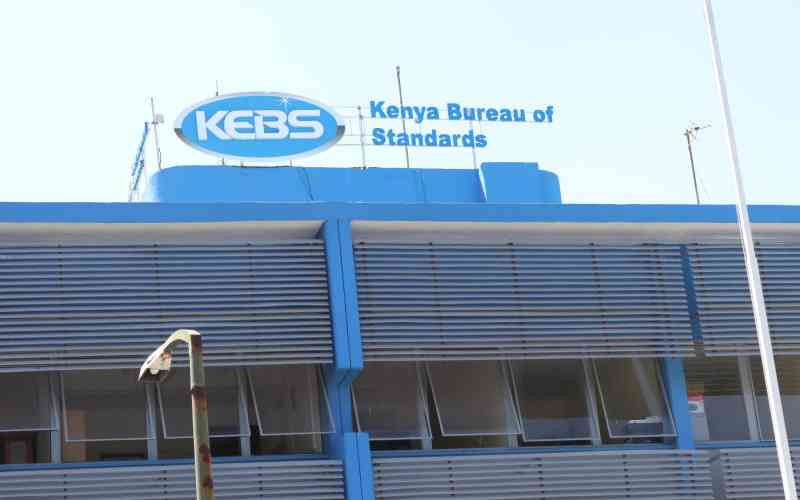The Kenya Bureau of Standards (KEBS) is doubling on strategic partnerships to enhance product quality and safety across the market.
Managing Director Esther Ngari said the agency has integrated collaboration into its core operations to effectively deliver on its mandate of setting and enforcing standards.
Speaking during the World Standards Day on Tuesday, themed “Partnership for Goals”, Ngari cited public health, food security, and energy as some of the areas Kebs is seeking to collaborate with the relevant agencies.
Follow The Standard
channel
on WhatsApp
She said, so far, Kebs’ partnership with the Ministry of Health on the national fortification programme has countered malnutrition.
“By developing and enforcing standards for the fortification of maize flour with essential vitamins and minerals, and by partnering with small-scale mills, we are ensuring that even the most vulnerable communities have access to affordable and nutritious foods,” she said.
“This is not just Kebs working in isolation; it is a partnership that directly contributes to SDG 2 (zero hunger) and SDG 3 (good health and well-being).”
The standards body has also partnered with the Energy and Petroleum Regulatory Authority (EPRA).
“Together, we guarantee the quality of fuel in our market. While EPRA regulates the sector, Kebs provides the testing and certification backbone against Kenyan standards,” said Ngari.
She said this collaboration protects consumers from substandard fuel that damages engines and pollutes the air, while also ensuring fair trade.
Ngari said Kebs’ engagement with academia demonstrates how the institution bridges the gap between research and real-world application.
“Aflatoxin is a silent threat on our food chain and a barrier to trade. By partnering with leading academic institutions, we are harnessing local research and innovation to develop more effective detection and control methods, protecting our people and unlocking export opportunities for our farmers,” she said.
Cabinet Secretary for Trade Lee Kinyanjui, noted that quality standards were key to unlocking trade opportunities. He listed the Kenya-Uganda memorandum of understanding (MoU) between Kebs and Uganda National Bureau of Standards and the East African Community (EAC) treaty that have helped unlock trade opportunities.
“These are more than trade agreements. They are collaborations that underscore how standardisation can drive diplomacy, trade and mutual development,” he said.
Follow The Standard
channel
on WhatsApp
The Kenya Bureau of Standards (KEBS) is doubling on strategic partnerships to enhance product quality and safety across the market.
Managing Director Esther Ngari said the agency has integrated collaboration into its core operations to effectively deliver on its mandate of setting and enforcing standards.
Speaking during the World Standards Day on Tuesday, themed “Partnership for Goals”, Ngari cited public health, food security, and energy as some of the areas Kebs is seeking to collaborate with the relevant agencies.
Follow The Standard
channel
on WhatsApp
She said, so far, Kebs’ partnership with the Ministry of Health on the national fortification programme has countered malnutrition.
“By developing and enforcing standards for the fortification of maize flour with essential vitamins and minerals, and by partnering with small-scale mills, we are ensuring that even the most vulnerable communities have access to affordable and nutritious foods,” she said.
“This is not just Kebs working in isolation; it is a partnership that directly contributes to SDG 2 (zero hunger) and SDG 3 (good health and well-being).”
The standards body has also partnered with the Energy and Petroleum Regulatory Authority (EPRA).
“Together, we guarantee the quality of fuel in our market. While EPRA
regulates the sector
, Kebs provides the testing and certification backbone against Kenyan standards,” said Ngari.
She said this collaboration protects consumers from substandard fuel that damages engines and pollutes the air, while also ensuring fair trade.
Ngari said Kebs’ engagement with academia demonstrates how the institution bridges the gap between research and real-world application.
“Aflatoxin is a silent threat on our food chain and a barrier to trade. By partnering with leading academic institutions, we are harnessing local research and innovation to develop more effective detection and control methods, protecting our people and unlocking export opportunities for our farmers,” she said.
Cabinet Secretary for Trade Lee Kinyanjui, noted that quality standards were key to unlocking trade opportunities. He listed the Kenya-Uganda memorandum of understanding (MoU) between Kebs and Uganda National Bureau of Standards and the East African Community (EAC) treaty that have helped unlock trade opportunities.
“These are more than trade agreements. They are collaborations that underscore how standardisation can drive diplomacy, trade and mutual development,” he said.
Stay informed. Subscribe to our newsletter
Follow The Standard
channel
on WhatsApp
By Graham Kajilwa
